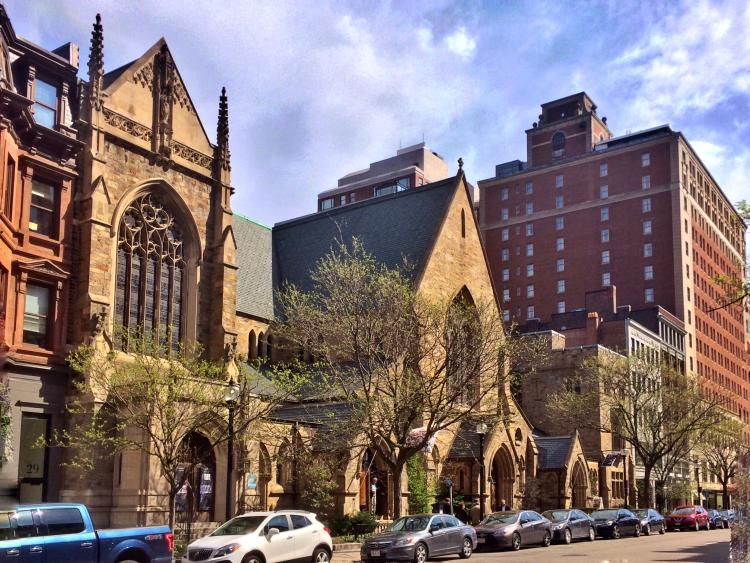On a typical week, Emmanuel Church on Newbury Street in Boston has more than 1,500 people come through its doors for a variety of services, both religious and secular. Constructed in 1861, Emmanuel Church is a historic building with historic preservation needs.
To meet some of these needs, Emmanuel applied earlier this year for a grant from the Community Preservation Fund collected through the Community Preservation Act for historic preservation, green space and affordable housing in Boston, and in June, received a grant of $307,000 to restore portions of the building's 200-foot long Newbury Street façade. This work will include restoration of the five wooden doors, reconstruction of the entryway staircases, replacement of a section of the roof and repairs to the center vestibule, where the masonry has cracked and rotated due to an expanding steam pipe in the basement.
This project is the latest in a series of preservation projects undertaken by Emmanuel since the 1990s, according to Peter Johnson, longtime parishioner and vestry member at Emmanuel, as well as project manager for the repairs. Johnson is also a member of Emmanuel’s Building Commission which meets weekly to address building issues and needs that arise.
Johnson described a shift in the mindset of the church that happened in the 90s where “there was a turnaround in our perception of the building from being almost an albatross--a monster that we would just never be able to maintain--to recognizing that it was really a great resource for our parish and the missions that we wanted to take on and accomplish, so with a lot of effort by a lot of people, we have been working on fundraising, both internal and external, to restore the parts of the building.”
Past projects, according to the grant application, included replacing major portions of the building’s roof in 1998, cleaning and repainting the Newbury Street masonry façade in 2002 and restoring two major stained glass windows in the nave in 2008 and 2017. The most recent project was the restoration of the masonry wall running the length of the back of the church. For that project, Emmanuel launched a collaborative capital campaign through the diocesan Together Now campaign and raised more than $600,000 to repair the wall.
The rector of Emmanuel Church, the Rev. Pamela Werntz, explained in an interview that in order to raise the money for that project, they posed the question of what the back wall stood for, both literally and figuratively.
“What does it represent and what happens if it falls apart? What do we lose?” Werntz said, “The church is not the building, it’s the people who are the church. But the people need a place to gather--place matters.”
These restoration projects are important not only to Emmanuel Church, but to the larger Boston community, as described in the grant application:
“Emmanuel’s location, accessibility and varied interior spaces have enabled us to serve Boston since 1861 as a dynamic center for the restoration of human dignity. In their current state of deterioration and dysfunction, Emmanuel’s entryways can be obstacles that harm our ability to offer a warm, Boston welcome to the more than 1,500 people we serve each week through: programs for vulnerable Bostonians; 17 weekly 12-step meetings; cultural events; visitors and staff of 501(c)(3) organizations, including the Institute for Justice and Democracy in Haiti and Emmanuel Music, Inc.; voters and election workers; and a women's shelter.”
Project Manager Peter Johnson said that it is because of volunteers from the Emmanuel congregation that the church was able to write a successful grant proposal and “for some people that’s one of the ways that they see they can serve the church, they can live out what we’re trying to do because they have expertise. Whether it’s because they’re in the building field or design or they’re editors and can write well, we figure out how to use the abilities that people have,” Johnson said.
Emmanuel Church also has a partnership with Central Reform Temple, a Jewish congregation that uses the building for their worship. In a letter that Rabbi Howard A. Berman and Dr. Jill Silverstein, President of Central Reform Temple of Boston, sent to Councilor Josh Zakim in support of the project prior to City Council's deliberations about the first round of CPA grants, they wrote: “As a sacred space of worship, as a cultural and arts venue, and as a place of shelter and healing for the most vulnerable among us, this building embraces and exemplifies all that is good about our beloved City on a Hill. The breadth of this work represents the essence of what the Community Preservation Act was conceived--and voted upon--to ensure...the enrichment of our City’s life through the renewal of its historic fabric, landmarks and public spaces.”
Werntz said that this is all about community, explaining that the various programs and organizations that use the space are all a part of Emmanuel’s wider mission to the city and the world.
“The idea is that if we invite the community into this building they will help us take care of it, and we will all be part of the community,” Werntz said. “It’s not like they’re just using our space but rather they are welcome in this place and their mission is our mission.”
--Bridget K. Wood



